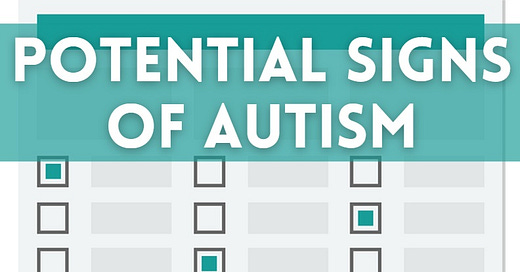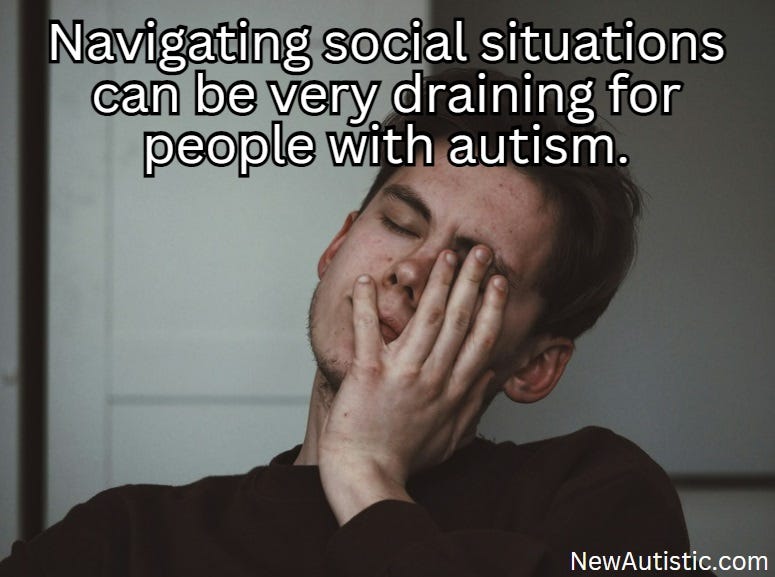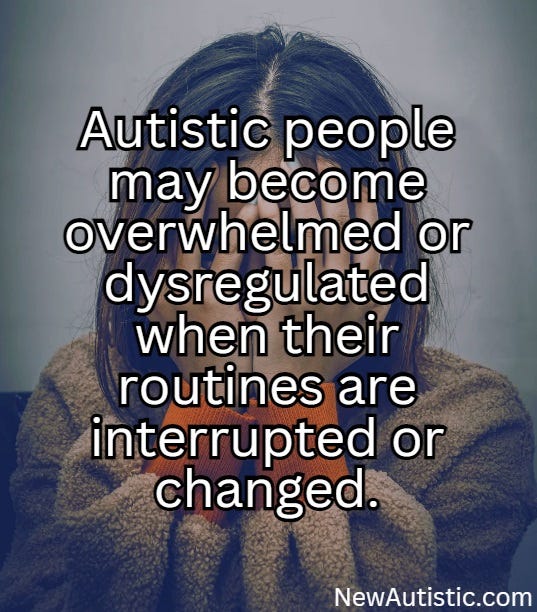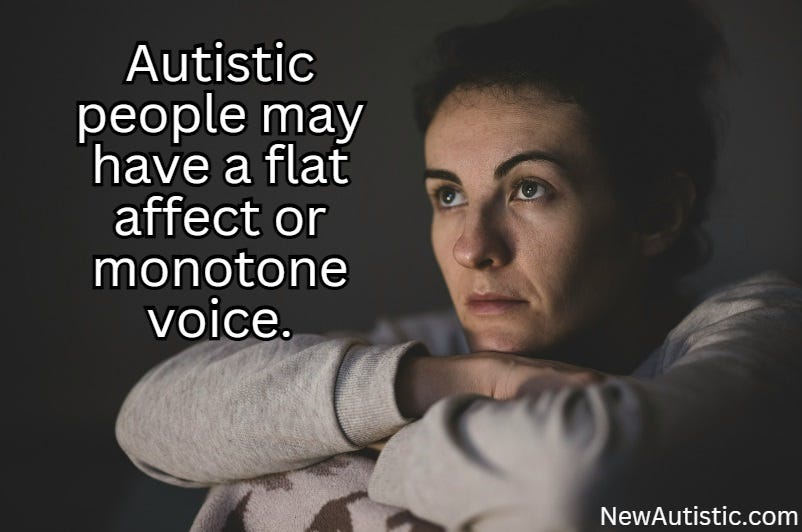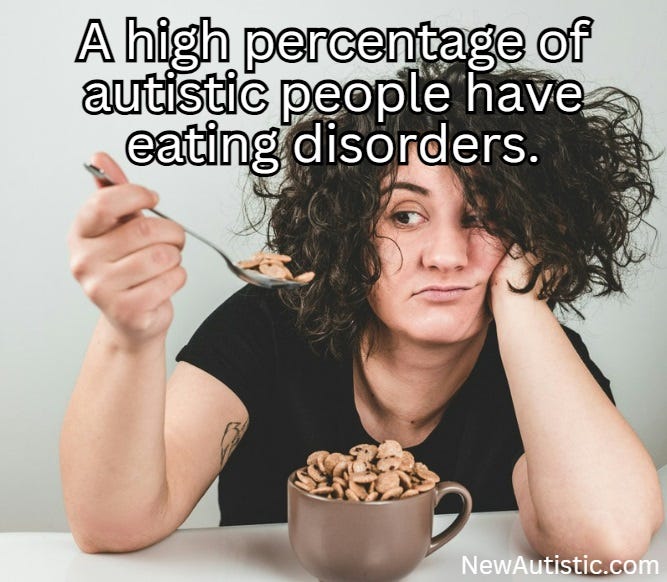Potential Signs of Autism
Could You Be Autistic? A Look at Some Common and Lesser-Known Indicators
What are some of the potential signs that you or a loved one might be autistic? This article will act as a compilation of signs and symptoms that may be related to Autism Spectrum Disorder (ASD), along with the sources that back up those claims.
Disclaimer: Please be aware that this list is not to be used as a means of diagnosis. Only a qualified healthcare professional can diagnose you, and this list is for informational purposes only. As I've said before, I am not a medical professional. Do your own research and come to your own conclusions, and if you suspect that you might be on the spectrum, consider reaching out to a mental health provider or your primary care doctor.
Explanation & Elucidation
Before I get to the list (which I intend to update regularly as new information comes to light), I want to remind you that if you've met one autistic person, you've met one autistic person. All of us are different, just like how all neurotypical people are different. That being said, there are a number of commonalities that can be found in people with autism, some of which are also found in the general population.
If you have a handful of symptoms on this list, congratulations! That means you're human! Almost all of us have some traits of many different medical diagnoses. You might have some traits of social anxiety, or some traits of obsessive-compulsive disorder (OCD), or some traits of bipolar disorder. Let me elucidate further:
Are you sometimes hesitant to speak with others in social situations? That's a trait of social anxiety, but that doesn't mean you have social anxiety.
Do you ever have intrusive thoughts, like jumping off a cliff or driving headlong into oncoming traffic? That's a trait of OCD, but that doesn't mean you have OCD.
Do you ever have increased energy or activity levels? That's a trait of bipolar disorder, but that doesn't mean you have bipolar disorder.
Having a few traits or signs of a specific disorder doesn't mean that you therefore have that disorder. Autistic traits are human traits, and I can guarantee that everyone reading this — neurotypical people (those not on the spectrum) included — is going to identify with at least some of these traits, signs, and symptoms of autism.
Identifying with a handful of these traits does not mean you're autistic. However, if you find yourself identifying with more than 75 percent of them (especially those in the "Core Signs" and "Potential Signs" lists), you might want to consider doing more research into autism and speaking with a healthcare professional. Again, as a friendly reminder, this list is not meant for diagnostic purposes.
Core Signs, Symptoms, and Traits of Autism
These two points (repetitive behaviors and interests and difficulties with social communication) are considered core traits of autism.
Repetitive Behaviors and Interests
Autistic people crave structure, routine, and sameness. It's a way that they can manage stress because they won't be surprised if they're always doing the same thing. This might mean always taking the same route to and from work, always exercising at the same time of day, or perhaps eating the same thing every day. When their routines are disrupted, they may end up extremely emotionally dysregulated which can result in meltdowns or shutdowns.
Furthermore, while everyone has their own preferences and likes, autistic people take it to the next level. They have intense special interests that they tend to be very knowledgeable about, perhaps bordering on obsessive to other people (case in point: this website). Even the stereotype of autism is a boy who is obsessed with trains or technology. Autistic women also have special interests, but because they tend to be more socially acceptable topics (animals, art, literature, music, or celebrities), they often fly under the radar.
Difficulties with Social Communication
Autistic people have trouble communicating both verbally and nonverbally. They may not pick up on subtle cues, and they may have abnormal body language and avoid eye contact. They also may struggle to interpret facial expressions, gestures, tone, and body language. This can impede communication with others and make life much more difficult for autistic people.
Potential Signs, Symptoms, and Traits of Autism
This list includes some of the potential signs, symptoms, and traits that are also commonly found in autistic people.
Hypersensitivities
Autistic people tend to have hypersensitivies (stronger sensitivities) to touch, lights, sounds, smells, tastes, temperatures, and/or textures than other people do. Understand that this sensitivity isn't just a dislike of something. For example, you might not like olives, but you probably aren't going to start dry heaving and puking if you accidentally eat one. People with autism can have extreme reactions to stimuli, up to and including seizures in cases of epilepsy (as epilepsy disproportionately affects autistic people compared to the general population).
Hyposensitivities
Along the same vein, autistics can also have hyposensitivities, meaning a lack of reaction to certain stimuli. Someone with hyposensitivity might have a lack of reaction to pain, not notice when they're hungry or full, or prefer deep-tissue massages to softer ones. Autistics with auditory hyposensitivity might not respond to their name being called or they may need verbal instructions to be repeated several times.
Alexithymia
About half of people with autism also have alexithymia, which means that they have trouble identifying and expressing their own emotions, as well as recognizing emotions in others. Some other signs of alexithymia include:
a limited ability to express their feelings to others
difficulty recognizing and responding to the emotions of others
the person might appear distant, unempathetic, or cold
Men in general are also more likely to have alexithymia than women: "Men were alexithymic almost twice (17%) as often as women (10%)."
Echolalia
About 75 percent of autistic people have echolalia -- a repetitive or imitative speech pattern. Echolalia is common in children, as evidenced when they repeat words and phrases that they hear. They might repeat a line from their favorite TV show or mimic the tone and voice used when they're told something and repeat it back to their caretaker. It's believed to be a learning tool as they are practicing how to speak.
However, people with autism often continue these behaviors well past childhood. They might repeat phrases they've heard or mimic sounds they hear, like the beep on the microwave or the rumble of a motorcycle driving by outside. It's thought to be used as a means of communication or as a form of stress relief or self-regulation.
Scripting
Many people with autism use scripting to help them navigate social situations. They may preplan conversations in their head, or have a list of questions or statements to use in certain situations. For example, an autistic person might rehearse either aloud or in their head what they plan to say during an upcoming phone call or work meeting. This can help to reduce stress because autistic people already have trouble with social communication and by planning out what they're going to say in advance, they can ease some of that stress.
Stimming
Stimming is a form of self-regulatory behavior that autistic people engage in. It's often done repetitively and impulsively. Some examples of stims include (but are not limited to) cracking knuckles, plucking hair, picking at skin, twirling hair, flicking fingers, pacing back and forth, humming, flapping hands, spinning or tapping objects, jumping, listening to the same song on repeat, or rocking back and forth. Echolalia, which was discussed earlier, can also be a form of stimming.
Emotional Dysregulation
People with autism tend to have more emotional dysregulation than neurotypical people -- that is, it's harder for them to regulate their emotions. They may seem to get flustered at insignificant things, or end up angry, upset, or frustrated if their routines are interrupted.
Trouble with Eye Contact
As touched on briefly before, autistic people have trouble making and maintaining eye contact. This can be especially problematic in societies like the United States where eye contact is seen as a sign of respect. A 2022 study found that regions of the brain are less active during eye contact in autistic people compared to neurotypical people -- a finding that may contribute the reason to autistic people find making eye contact stressful.
Trouble Forming Relationships
Due in large part to autistics' trouble with social communication and knowing their own emotions, many autistic people have trouble forming relationships, both socially and romantically. That doesn't mean that they don't want relationships -- only that it's more difficult for autistic people to form and maintain them. There is also some evidence that people with autism prefer other neurodivergent people as friends and romantic partners.
Executive Functioning Issues
Up to 80 percent of people with autism have trouble with executive function. This might include issues with time management, organization, working memory, and inhibitory or impulse control. This can make even simple tasks like brushing your teeth, planning a trip, or cleaning the house very difficult. (I touched on this a little bit in my blog post Life on Heroic: Living with Undiagnosed Neurodivergency.)
Uneven Language Development
Some autistic people have delayed or uneven language development, perhaps not speaking at all for years as children (often referred to as being nonverbal). Some also may be able to speak and read, but not necessarily comprehend what they just read.
Lesser-Known Potential Signs, Symptoms, and Traits of Autism
These are some of the lesser-known potential signs, symptoms, and traits of autism.
Taking Things Literally
Many autistic people fail to understand colloquialisms and/or take things literally. For example, when I say, "a bird in the hand is worth two in the bush," do you imagine a bird in your hand and two in the bush? Or, like most people, do you innately understand that it means to value what you have?
Joint Hypermobility
Up to 80 percent of autistic people have overly flexible joints and muscles which can lead to chronic pain and injuries. Another study suggested that 51 percent of neurodivergent people have hypermobility. It's not clear why this is and more research needs to be done on the topic.
Left-Handedness
Did you know that people with autism have a higher rate of being left-handed as compared to the general population? According to HealthCentral: "People with ASD tend to have reduced leftward language lateralization, which could be why they also have a higher rate of being left-handed compared to the general population."
Dyspraxia or Clumsiness
Dyspraxia (the impaired performance of skilled gestures) is more commonly found in those with autism than control groups. This might mean that you bump into things often, have poor coordination, or have trouble with some basic motor skills.
Having Colic
Did you have colic as an infant? There are some studies that suggest there may be a link between excessive crying and autism: "Persistent crying in infants (i.e. excessive crying with late onset and long duration) may be an early symptom of ASD."
Flat Affect
People with autism may have a flat affect and a monotone voice. This means that they may not react in ways that neurotypical people might expect, and the autistic person may be incorrectly viewed as apathetic, uncaring, or unkind. Also note that many autistic people often mask their flat affect and work hard to seem neurotypical.
Hyperlexia
About 6 to 14 percent of autistic people are hyperlexic, meaning they might have a wide vocabulary, prefer books and magnetic letters to other types of toys as children, and may have a knack for remembering dates and numbers.
Sleep Issues
Many autistic people struggle with issues related to insomnia, including waking up early, an inability to fall and stay asleep, and daytime drowsiness due to poor sleep patterns. Additionally, some autistic people experience sleep-related movement disorders and may end up either kicking in their sleep or engaging in other repetitive movements of the limbs, torso, or head. It's thought that these movements might resemble stimming behaviors.
Self-Medication
Autistics are more than three times more likely to use substances to manage their mental health symptoms, including anxiety, depression, and suicidal ideation.
Addiction Issues
People with autism are twice as likely to abuse substances compared to control groups, especially those with Level 1 ASD. Many autistic people use drugs and alcohol to try to fit into social situations and manage stress levels. (I discussed some of my own addiction struggles in my blog post A Knight in Shining Armor.)
Toe Walking
Many children walk on their toes, usually to about age three, but autistic children may continue to walk on their toes well past that age. One study found that 8.4 percent of autistic children had a diagnosis of persistent toe walking. Some speculate that toe walking may be the result of having tight heel cords or may be caused by a dysregulated vestibular or sensory system.
Bullying
Were you bullied as a child? One study showed a high percentage of bullying against autistic children: 75 percent of autistic children were left out of activities by other children, 37 percent were teased, and 13 percent were physically bullied.
Feeling Disliked By Others
Many autistic people complain that they feel that others judge them harshly or unfairly throughout their lives. "I feel like an alien" is a common refrain amongst autistics. And it's not just a feeling, either. There is mounting evidence that neurotypical people treat autistic people worse than non-autistics:
A study conducted in 2021 showed that neurotypical people react less favorably toward autistic people, even if they don't know the person is autistic: "Nonautistic people were more likely to say they disliked the person in the video if they were autistic, even though they did not know the diagnosis."
A 2016 study in Nature found that neurotypical people are less willing to interact with those with autism: "We find that first impressions of individuals with ASD... are not only far less favorable across a range of trait judgments compared to controls, but also are associated with reduced intentions to pursue social interaction."
A 2021 study suggested that autistic people are viewed as deceptive and lacking credibility, even when telling the truth: "Autistic individuals [are] perceived as more deceptive and less credible than neurotypical individuals when telling the truth." However, this may be because of an autistic person's overall presentation, as the authors stated.
That being said, autistic people tend to have higher levels of rapport with other autistic people. So, if you've got a bunch of autistic friends, you might want to do some more research and introspection.
More Likely to Be Victimized
Unfortunately, autistic people are more likely to be victimized and abused in a number of ways: "Participants with [autism] reported experiencing, as children, more overall victimization; specifically, more property crime, maltreatment, teasing/emotional bullying, and sexual assault by peers, compared to participants without [autism]."
Eating Disorders
Many autistic people struggle with eating disorders, both eating too little (anorexia) and eating too much (binge eating), as well as avoidant/restrictive food intake disorder (ARFID). One study found that atypical eating behaviors affected 70.4 percent of children with autism, which is quite a jarring statistic compared to the 4.8 percent of neurotypical children who have eating disorders. Autistic females are also more likely to experience eating disorders. It's speculated that because autistic people have trouble with interoception (the process of perceiving senses inside the body like thirst, hunger, fullness, and pain), it's harder for them to eat intuitively.
Final Thoughts
I want to remind everyone that, even if you are autistic, you probably aren't going to have every sign, trait, or symptom on this list. Every autistic person is different. You can also have what are known as sub-clinical autistic traits — that is, you may have a number of autistic traits but you don't have enough (or they don't impact your life enough) to qualify for an Autism Spectrum Disorder (ASD) diagnosis.
If you think you or a loved one might have ASD, please see a qualified mental health professional.
Thanks for Reading!
Thanks for taking time out of your busy day to spend some time with me! I encourage all of my readers to RISE (Reflect, Improve, Strengthen, & Evolve) with me because healing is a lifelong journey — it’s not always easy, but it’s always worth it. You are loved, cherished, and valued. Don’t ever let anyone ever convince you otherwise.
My commitment to bringing you FREE, well-researched, and comprehensive content means I spend considerable time and effort writing each article or post without compensation.
Want to Support Me?
The simplest FREE way you can support me is by subscribing, sharing, or leaving a comment:
I believe in keeping my content accessible to everyone, without paywalls, because I know the work I do matters. For that reason, I’m beyond grateful for any financial support! If you'd like to support me and my work, check out my art website at AriesArtwork.com to bring home something unique or find a gift for that special someone in your life:
I’ll see you again when I’ve got a new info-dump for you, my Newtistics Crew!
—Skylar Aries


